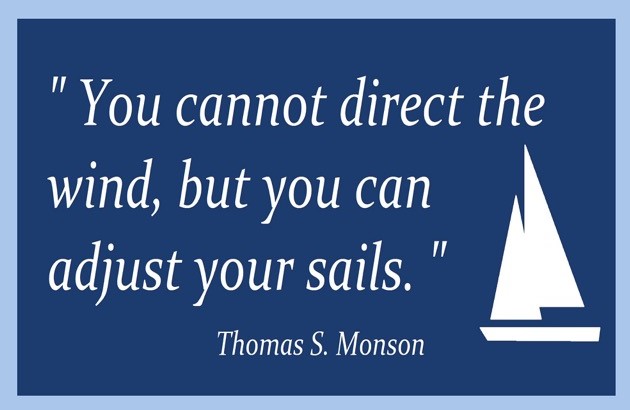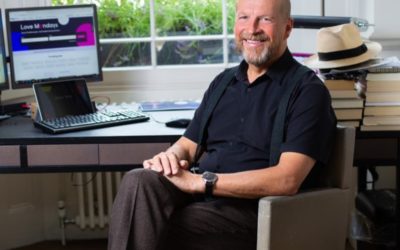Navigating a career storm can be a turbulent experience, when you don’t know what lies ahead. Most of us hadn’t even heard the term ‘furloughed’ until this year, now it’s something we hear every day. It’s the new kid on the block, hanging out with ‘redundancy’ and ‘career uncertainty’. For many, this situation feels like our map has been carried away by the wind and we no longer know where or how to put down an anchor.
Whether you’re worried about your future employment or you’re an employer making tough decisions – the ambiguity of not knowing what lies ahead can be excruciating and has put us all in flux. They say no one prepares you for parenthood – well no one has prepared us for a global pandemic either.
Helping each other and taking care of ourselves is all we’ve got. With this in mind, this is the first in a series of three articles created to offer you practical help, ideas and inspiration. I want you to be able to ride this journey in a watertight boat and be the captain of your own ship.
Has your brain been hijacked?
If you’ve been struggling to think straight recently, go easy on yourself. When we feel threatened, fearful, anxious and overwhelmed, it can throw us into a ‘fight or flight’ response (sometimes known as the ‘amygdala hijack’). This overrides the rational, thinking part of our brain, causing us to feel overwhelmed and find it almost impossible to focus and think straight.
As I’ve coached clients around the globe through this crisis, I’ve been hearing first-hand how people at all stages of their careers are experiencing this. Common themes have been concerns about health, jobs, finances and loved ones, compounded with additional stresses such as home schooling, caring for family and working or leading teams through this. All creating the perfect storm.
Whatever your situation is, focussing on re-fuelling ‘you’ can help make sure you have the energy, resources and resilience needed to move your career forward with clarity and purpose.
Meet yourself where you are at.
The conversations we have with ourselves are so important yet unchecked can be potentially destructive. Have you ever thought what your own internal dialogue sounds like?
I’ve noticed the word ‘should’ is coming up in many conversations I’m having with clients. Have you heard your internal dialogue saying any of these?
- ‘I should be grateful that we’re all healthy.’
- ‘I should be helping my children with their schooling.’
- ‘I should be able to focus and not get distracted.’
- ‘I should be doing more to help others.’
- ‘I should be able to support my family.’
- ‘I should be applying for a new job.’
The cousin of ‘should’ is ‘I’m not enough’ and is often the catalyst for feeling guilty. This leaves the door wide open for your inner critic to enter, who loves to tell you you’re doing it all wrong – that you should be doing it differently. You can feel that everyone else is doing better than you – but the truth is they’re not. I talk to a lot of people and trust me, I’ve not met anyone yet who actually has this sorted.
Check in on yourself
You have most likely, taken time to check in on your friends, family and colleagues. But have you checked in on yourself?
What’s your internal landscape looking like? Are you feeling stressed, angry, disappointed, worried or anxious? And how is this manifesting in your body and your behaviour? Maybe your shoulders are tight or your stomach feels tense, perhaps you have a headache or are not sleeping properly? How does it play out in your mood?
Emotions are your Energy in Motion
Emotion literally means ‘energy in motion’. This can help us to acknowledge our emotions and breathe into them to allow them to pass through us. In order to think straight we need to calm down the nervous system and quieten the analytical mind which is often on a loop and can make our thoughts feel like they are spiralling out of control.
Mindful – not Mind-Full
The term ‘mindfulness’ can be an instant turn off for some people, often misconceived to mean inner peace, when actually it’s about being present with what we are feeling right now. It’s about being mindful rather than ‘mind-full’.
Try thinking of your mind as having two settings:
- Setting 1: This is our ‘default’ setting. It’s where we’re thinking about something in the past we can’t change, something in the future that hasn’t happened yet and the lists of things we haven’t done. This is the setting that gives rise to worry, doubt and ‘what if’s.
- Setting 2: Mindful. This is being present in the moment we are in. It’s where we focus on one thing that we are currently doing. The walk we’re taking, the conversation we’re having with a colleague, the help we’re giving, the email we’re writing or the view we’re looking at.
A simple exercise is to just observe how many times during the day you are in ‘default’ and gently bring yourself back to the present.
Breath
This isn’t just saying breathe and all your stress will go away – but it’s a good start. Breath is our life force and calms the nervous system. Try it now. Pause reading just for a moment.
Relax and take an expansive breath in for four seconds, hold it for four and breathe out slowly for four. Do this three times. How do you feel?
Identify your pillars
My sister has four pillars that she lives by. For her they are exercise, water intake, food and sleep. She has a new-born baby so most of these are out the window, but she knows these are the key to her well-being. When things start to go really pear-shaped for her she reverts to her pillars to re-fuel herself again.
We all have our own pillars that we depend on the most to function. Can you work out what yours are? What fills your cup and gets you into a positive space? It could be walking the dog every day, time alone, connecting with friends, seven hours sleep, exercise or listening to music. There is no right or wrong, only what works for you.
Make friends with uncertainty
Uncertainty is easier to face when we’ve controlled what’s within our range. It enables us to say, ‘I did everything I can,’ and therefore live more comfortably with the result. For example, if our current uncertainty is how to find our next job, we can take action and make sure our CV is up-to-date, looking good and ready to go. Once we’ve done what we can there is also power in allowing ourselves to accept and welcome the unknown.
As a coach I’ve learnt over the years that when a client is in a difficult situation, it’s okay not to have all the answers straight away. By acknowledging the challenge but letting go of the desired outcome, solutions often arise in the space between.
“If we let go of the outcome, solutions can often arise in the space between.“
I hope this has given some food for thought as we all navigate these choppy waters. Finally, I want to leave you with some practical tips – so here are a couple of things you can start doing today.
Two things to try
- Be Mindful, not Mind-Full. Notice how many times you are in ‘default’ during the day. Gently bring yourself back to the moment you are in.
- Observe your inner critic. What is it saying to you and how does it sound? Ask yourself if you would you speak to a friend like this? Is this helpful? Try reframing the internal dialogue from a place of self-compassion and try to be your own best friend. For example if you find your inner critic telling you, ‘I’m never going to be offered a job this year,’ try replacing it with, ‘I wonder what new opportunities might arise out of this situation.’
Don’t let facts become stories led by your inner critic. For example, it’s common for people experiencing redundancy to create ‘stories’ around this fact. These could be stories of not being wanted, not being good enough. Treat them like any other story you are writing – it’s based on fiction and as the author, you can write your own ending.
“One of our greatest freedoms is how we react to things“
Charlie Mackesy, The Boy, the Mole, the Fox and the Horse
his is the first in a series of three articles written by Executive Coach Yvette Jeal PCC (www.yvettejeal.co.uk) to support the ‘Keep Britain Working’ campaign – click here to read the second article and join Yvette and James Reed in a free webinar at 12pm on 10th June, where they will be discussing useful tips and ideas for getting back into the workplace. Register here to join.
Yvette Jeal PCC is an ICF Certified Executive Coach with 20 years’ corporate experience. In addition to executive coaching, Yvette runs bespoke career transition programmes to help people get back in to work. She works with C-Suite, Board Level Executives, Directors and emerging leaders in the UK and internationally. Her diverse client base includes major organisations in tech, fintech, finance, banking, aviation, engineering, healthcare, legal sector
Contact her on 07879 602286 or yvette@yvettejeal.co.uk
Further reading







